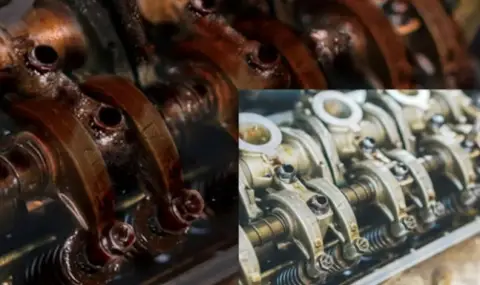One of the topics discussed among drivers is the need to flush the engine when changing the oil. Many people think that with regular oil changes, flushing the engine is not necessary, especially when the car is used in the city.
Daily trips to work, school or the store are considered to not put much strain on the engine and engine oil. But in fact, frequent short trips can lead to the accumulation of oil deposits, sludge and soot in the engine, because the oil does not have time to reach optimal operating temperature.
Let's take a look at how these deposits form and how they can be removed easily and quickly. Heat and oxygen contribute to the oxidation of the oil, leading to the formation of acids and insoluble components.
This often results in tarry or varnish-like deposits. Sulfur oxides, formed when burning sulfur-containing fuel, are also released through the exhaust system, but some of them end up in the crankcase, contaminating the engine oil.
When the piston rings begin to work poorly, this leads to so-called "dirty burning", which increases the amount of deposits. And the problem gets worse: the worse the rings hold the oil, the more it burns in the combustion chamber and the more deposits form on the rings.
In such cases, a thorough engine cleaning can reduce oil consumption and prevent expensive repairs. Modern motor oils have a limited safety margin and balanced additive packages with reduced ash content and low alkalinity. This makes them efficient but sensitive to pollution, which is inevitable due to fuel quality, driving style, oil quality and engine characteristics.
When changing the oil, the dirt particles that the oil keeps in a suspended state merge with it from the crankcase. However, the amount of dispersants in the oil is limited and they cannot hold all the dirt. Therefore, carbon deposits inevitably form in the engine, which are not washed away with the used oil.
The conclusion follows that only changing the oil is not enough - additional washing of the engine with special means is necessary
Initially, the so-called washing oils, but it turned out that they are not the best option, since some of them remain in the system after draining, and this oil does not meet the requirements of car manufacturers and does not contain the necessary additives.
To solve this problem, there are special additives for washing the engine, which are added to the old oil before its change. Let's look at the principle of their work. During 10 minutes of engine idling before draining the old oil, this additive dissolves sludge and deposits, which are then removed with the used oil.
In this way, the additive temporarily improves the cleaning properties of the old oil and, thanks to a fresh portion of dispersants, allows you to remove all impurities from the oil system. After that, the cleaned engine and fresh oil can work at full capacity.
